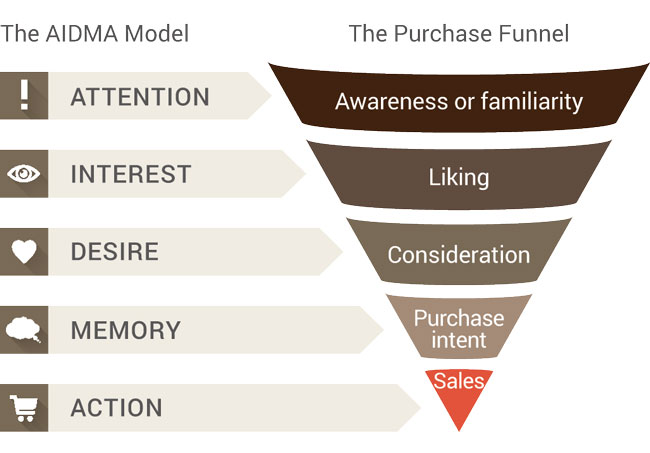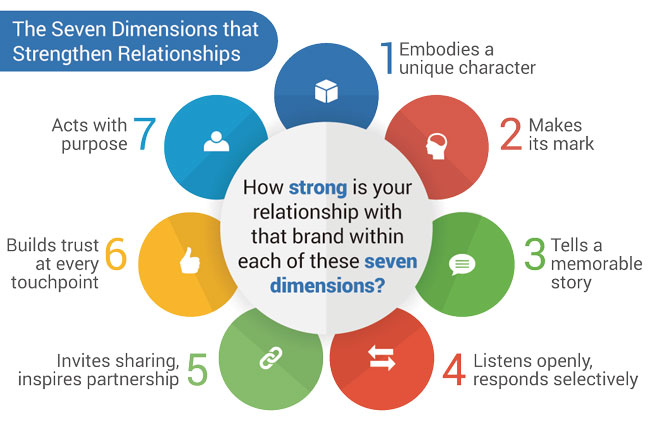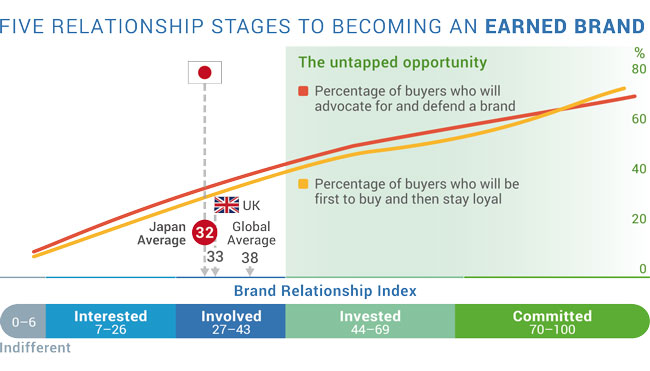Marketing used to be simple—the focus was on attention, interest, desire, memory, action. The more we advertised, the more awareness and appreciation we gained, eventually resulting in sales.
Today, 20 years since Windows 95 made the Internet available to the mass market, and 10 years since Twitter and Facebook opened up an entirely new territory called social media, we still practice the same routine.
Of course, the digitisation of our audience has allowed marketers to create variants that insert search, sharing and comparison into the equation. And some have invented new concepts, such as stature, relevancy and loyalty to replace awareness, liking and purchase-related considerations. But the foundations have been the same since the model was first proposed in 1924.
Deep down, we may question how meaningful it is to spend so much on brand trackers that focus on measuring awareness and liking. Yet the key performance indicators we emphasise remain the same. Of course, if the scores don’t show progress, someone—often the chief marketing officer (CMO)—gets the blame.
So why are CMOs suddenly finding themselves on the endangered species list? The problem lies in the fact that, while marketing strategies have evolved, the way outcomes of those strategies are measured largely has not.
 I suggest we are not measuring things that today’s more evolved marketing executions are in the best position to affect, namely, consumer–brand relationships. Unless those ties are measured and tracked over time, CMOs cannot show how marketing improves a brand’s engagement with consumers. Nor can they design optimal link-building campaigns unless what builds relationship strength is fully understood.
I suggest we are not measuring things that today’s more evolved marketing executions are in the best position to affect, namely, consumer–brand relationships. Unless those ties are measured and tracked over time, CMOs cannot show how marketing improves a brand’s engagement with consumers. Nor can they design optimal link-building campaigns unless what builds relationship strength is fully understood.
A 2013 report by US technology and market research firm Forrester suggests that leading brand-health measuring agencies need to reconsider their existing models and begin to integrate new methodologies if they want to remain on top. And that does not mean just counting the number of clicks, mentions and followers, but also the outcomes in terms of behaviour and attitude.
Yet, we still see many briefs that ask us to help our clients raise awareness or liking. To reflect the lack of evolution in approach, Edelman developed a Brand Relationship Index (BRI) to measure the strength and quality of relationship a brand has with consumers.
 The Earned Brand Relationship model allows brands to develop and evaluate strategic plans based on their impact on seven relationship dimensions that form the overarching BRI. Based on their overall index score, consumers can be assigned to one of five relationship stages.
The Earned Brand Relationship model allows brands to develop and evaluate strategic plans based on their impact on seven relationship dimensions that form the overarching BRI. Based on their overall index score, consumers can be assigned to one of five relationship stages.
The average index score in Japan is 32, somewhere in the middle of “Involved”. This means consumers in Japan, at least when it comes to their favourite brands, aren’t just making an educated choice. They are demonstrating a clear preference for the brand they purchase or use.
Consumers appreciate what the brand stands for and so, if they cannot find an item they want, they will even scan shop shelves or ask someone whether the item has been moved. Thus, a score of 32 is not particularly bad and indicates that brands are actually doing fairly well by traditional measures of success.
However, the research also shows that consumers are willing to go even further. They want stronger, more meaningful and more beneficial relationships with brands. Consumers want brands to play an active role in their lives beyond their products and services. They want shared values, shared action, and want to see a present and future together.
Strong relationships matter these days and need to be measured, especially in a market like Japan, where what you see on the morning TV show gets sold out the next day. Attention then quickly shifts to another product the next month. If brands can elevate their relationship with consumers from “Involved” to “Invested” or “Committed”, our research shows that a clear majority of their customers will not only be the first to buy their innovations and stay loyal in the face of competitive pressure, but they will also advocate for and defend the brand, even in a crisis situation.
 The study also reveals a huge lift among committed consumers in wanting to participate in creating brand content, and a willingness to share personal data with the brand. These are all particularly important in an age where bad news or rumours can get out of hand on social media and technologies such as ad-blockers are becoming popular.
The study also reveals a huge lift among committed consumers in wanting to participate in creating brand content, and a willingness to share personal data with the brand. These are all particularly important in an age where bad news or rumours can get out of hand on social media and technologies such as ad-blockers are becoming popular.
If this leads you to want to better understand how you can achieve commitment—thereby unlocking the full potential and benefit of the relationship that unites you with your customers—you next need to take a moment and ask yourself if you are measuring and tracking relationship strength in a systematic and scientific manner. And, if so, are you using that information as the foundation for planning your marketing campaign strategies?
Find out more here.

